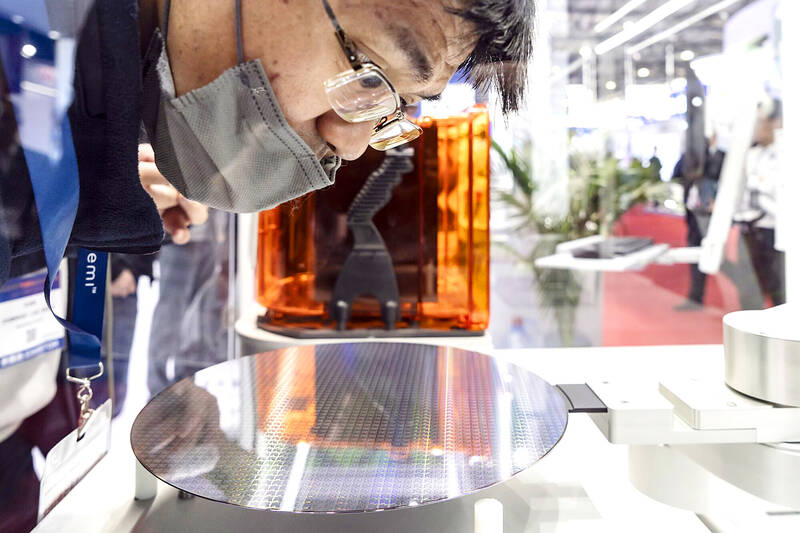Semiconductor equipment supplier Acter Group Co (聖暉) yesterday said it has secured record-high orders amounting to NT$31 billion, up 2 percent from last year, benefiting from an investment spree on new chip manufacturing facilities in China and Southeast Asia.
As Beijing aims to push for a chip self-sufficiency rate of 70 percent next year, Chinese chipmakers are showing strong ambition to build more facilities this year, Acter said.
About 30 new fabs, mostly less advanced, would be under construction by the second half of this year, it said.

Photo: Bloomberg
“We have received more orders than we had anticipated. China continues to show strong demand,” Acter president Lai Ming-kun (賴銘崑) told an investors’ conference in Taipei. “Most Chinese fabs are to make chips on 16-nanometer technologies and other mature process technologies, as advanced equipment and materials are banned from being exported to China due to the US-China trade dispute.”
Southeast Asia would be another region with strong growth this year as Taiwanese electronics companies and chip packaging service providers are allocating production to Malaysia, Vietnam, Thailand and Indonesia to minimize risks of geopolitical tensions, Lai said.
Rapid demand in the region is the main reason behind the company’s optimism about this year’s revenue growth, the company said.
Customers plan to produce servers, printed circuit boards and other electronic components at new factories.
Three months ago, the clean room equipment supplier was neutral about this year’s outlook, it said.
Acter expects revenue this year to return to growth, after dipping 11 percent year-on-year to NT$25 billion (US$785.4 million) last year.
China was the biggest revenue contributor last year with a 49 percent share, followed by Taiwan at 42 percent and Southeast Asia at 9 percent, it said.
Acter is also looking at new business opportunities in Japan and India, Lai said.
Acter counts the world’s major foundry companies, including Taiwan Semiconductor Manufacturing Co (台積電), United Microelectronics Corp (聯電) and Semiconductor Manufacturing International Corp (中芯), among its customers.
Nova Technology Corp (朋億), an equipment manufacturing subsidiary of Acter, would have greater exposure to Japan this year, the company said.
Nova specializes in supplying high-purity chemical supply and dispensing systems, special gas supply systems and high-level wet-process equipment for cleaning.
The company is considering setting up a Japanese unit as two of its main customers are mulling building new plants there, it said.
The firm has secured record-high orders of NT$11 billion, with about 70 percent coming from Chinese customers and 20 percent from Taiwan, it said.
Nova expects revenue this year to reach NT$10 billion, up 9.4 percent from NT$9.14 billion last year.

Greek tourism student Katerina quit within a month of starting work at a five-star hotel in Halkidiki, one of the country’s top destinations, because she said conditions were so dire. Beyond the bad pay, the 22-year-old said that her working and living conditions were “miserable and unacceptable.” Millions holiday in Greece every year, but its vital tourism industry is finding it harder and harder to recruit Greeks to look after them. “I was asked to work in any department of the hotel where there was a need, from service to cleaning,” said Katerina, a tourism and marketing student, who would

i Gasoline and diesel prices at fuel stations are this week to rise NT$0.1 per liter, as tensions in the Middle East pushed crude oil prices higher last week, CPC Corp, Taiwan (台灣中油) and Formosa Petrochemical Corp (台塑石化) said yesterday. International crude oil prices last week rose for the third consecutive week due to an escalating conflict between Israel and Iran, as the market is concerned that the situation in the Middle East might affect crude oil supply, CPC and Formosa said in separate statements. Front-month Brent crude oil futures — the international oil benchmark — rose 3.75 percent to settle at US$77.01

Merida Industry Co (美利達) has seen signs of recovery in the US and European markets this year, as customers are gradually depleting their inventories, the bicycle maker told shareholders yesterday. Given robust growth in new orders at its Taiwanese factory, coupled with its subsidiaries’ improving performance, Merida said it remains confident about the bicycle market’s prospects and expects steady growth in its core business this year. CAUTION ON CHINA However, the company must handle the Chinese market with great caution, as sales of road bikes there have declined significantly, affecting its revenue and profitability, Merida said in a statement, adding that it would

UNCERTAINTIES: The world’s biggest chip packager and tester is closely monitoring the US’ tariff policy before making any capacity adjustments, a company official said ASE Technology Holding Inc (日月光投控), the world’s biggest chip packager and tester, yesterday said it is cautiously evaluating new advanced packaging capacity expansion in the US in response to customers’ requests amid uncertainties about the US’ tariff policy. Compared with its semiconductor peers, ASE has been relatively prudent about building new capacity in the US. However, the company is adjusting its global manufacturing footprint expansion after US President Donald Trump announced “reciprocal” tariffs in April, and new import duties targeting semiconductors and other items that are vital to national security. ASE subsidiary Siliconware Precision Industries Co (SPIL, 矽品精密) is participating in Nvidia